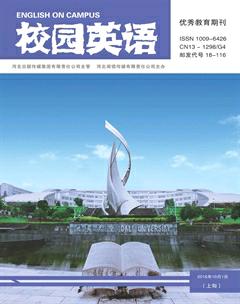A Lady’s Tragic life
裴新南
【Abstract】A Rose for Emily is one of William Faulkners most famous short stories. Through the representing of patriarchy influence on Emily, Faulkner shows his readers Emilys tragic life. This paper tries to analyze the characteristics of Emily in A Rose for Emily accords well with Freudian psychoanalytic theory, for there are similar conflicts among the id, the ego and the superego in the plot development. By analyzing several important facts in the novel through employing Freudian theory of human psyche, this paper gives the explanation to the causes of the conflict and clash between Emily and the society, and then deeply explores the concerns of inner heart.
【Key words】William Faulkner; A Rose for Emily; psychoanalytic theory
A. Personality Structure of Emily
1. Emilys Id
In A Rose for Emily, the protagonist Miss Emily can be seen as the symbol of the id. She ignores the social morality, only to follow the pleasure principle. Time and time again, she tempts the id to satisfy her desire for happiness. Just like the novel tells,“She carried her head high enough—even when we believed that she was fallen...as if it had wanted that touch of earthiness to reaffirm her imperviousness.”(Faulkner, 1950:60) As the embodiment of the id, Emily is representative of kinds of instincts, especially the love instinct.
After Emily struggles to free herself from her family, she tried to control Homer. But when she learns that “He liked men...that he was not a marrying man” (Faulkner, 1950:58) and she can not own Homer forever, her love becomes crazy and she murders him. In this way, she keeps her lover and retaliated against her father.
All women in the world yearn for the admiration of men, and Emily is no exception. However, Emilys father rules her life with an iron fist, turning away every suitor the young girl has. The excessive love brings great hurt to Emilys heart and personality. Lacking of experience of love, Emily considers marriage as a romantic game, and naively believes that Homer can give her true happiness.
2. Emilys Ego
We can feel Emilys ego lying in her change in appearance after her fathers death. “When we saw her again, her hair was cut short, making her look like a girl, with a vague resemblance to those angels in colored church windows—sort of tragic and serene.”
Maybe after her father died, she is free from the thought fetters set up by him and finally realizes in her unconsciousness that she should change from her conservative and out-of-date appearance to an appearance more similar and harmonious to people around for better socializing. Her cut hair conforms to the conventional hairstyles for ladies in the town, which suggests that in her deep heart she is eager to lead a life as other ladies do though she has not been aware of this.
3. Emilys Superego
We can find out that Emilys superego lies in her spiritual contributions to her family and her community. “Alive, Miss Emily had been a tradition, a duty, and a care; a sort of hereditary obligation upon the town.”
Ever since she was born, she has to respect her fathers decisions and submit to her family and the communitys morality. Though these all seem to be abnormal and distorted, her mighty spirits for collective thoughts and courage to sacrifice herself have expressed superego which win the communitys respect.
Conclusion
The clash between Emily and the society, the others and herself prevents her from dealing with the id, the ego and the superego reasonably. Emily wholeheartedly finds way to satisfy her desires, disdaining the social morality by the superego and ignoring the supervision by the ego. However, the resistance from the ego and the superego still depresses her. As a result, Miss Emilys soul becomes tortuous and mentality abnormal. The analysis of ones psychology development is, therefore, important to fulfill ones happy life, and a way to avoid tragedy like Emilys.
References:
[1]付晓芳.A Psychoanalytic Interpretation of Self in A Rose for Emily[J].海外英语,2014.
[2]洪增流,郝燕.用弗洛伊德的人格结构理论解析《献给艾米丽的玫瑰》[J].安徽理工大学学报(社会科学版),2006.
[3]洪增流,郝燕.用弗洛伊德的人格结构理论解析《献给艾米丽的玫瑰》[J].安徽理工大学学报(社会科学版),2006.
[4]倪萍.《献给艾米丽的玫瑰》中艾米丽的性格解析[J].绵阳师范学院学报,2013.
[5]史风华.心理批评之路:从弗洛伊德到弗莱[J].河南大学学报(社会科学版),2006.
[6]夏祖贵.Symbolic Meanings of “Rose” in A Rose for Emily [J].英语广场(学术研究),2012.
[7]张小宁.解读《献给艾米莉的玫瑰》中的几组重要关系[J].西安航空学院学报,2014.

